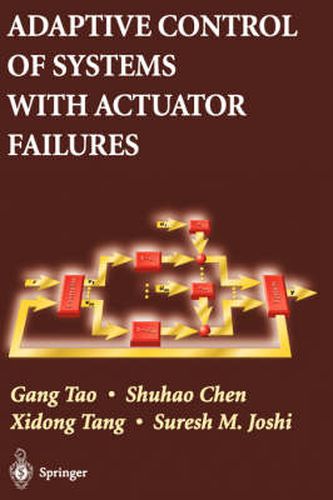Readings Newsletter
Become a Readings Member to make your shopping experience even easier.
Sign in or sign up for free!
You’re not far away from qualifying for FREE standard shipping within Australia
You’ve qualified for FREE standard shipping within Australia
The cart is loading…






This title is printed to order. This book may have been self-published. If so, we cannot guarantee the quality of the content. In the main most books will have gone through the editing process however some may not. We therefore suggest that you be aware of this before ordering this book. If in doubt check either the author or publisher’s details as we are unable to accept any returns unless they are faulty. Please contact us if you have any questions.
When an actuator fails, chaos or calamity can often ensue. It is because the actuator is the final step in the control chain, when the control systems instructions are made physically real that failure can be so important and hard to compensate for. When the nature or location of the failure is unknown, the offsetting of consequent system uncertainties becomes even more awkward. Adaptive Control of Systems with Actuator Failures centres on counteracting situations in which unknown control inputs become indeterminately unresponsive over an uncertain period of time by adapting the responses of remaining functional control systems. Both lock-in-place and varying-value failures are dealt with. The results presented demonstrate: the existence of nominal plant-model matching controller structures with associated matching conditions for all possible failure patterns; the choice of a desirable adaptive controller structure; derivation of novel error models in the presence of failures; the design of adaptive laws allowing controllers to respond to combinations of uncertainties stemming from activator failures and system parameters. Adaptive Control of Systems with Actuator Failures will be of significance to control engineers generally and especially to both academics and industrial practitioners working on safety-critical systems or those in which full-blown fault identification and diagnosis is either too time consuming or too expensive.
$9.00 standard shipping within Australia
FREE standard shipping within Australia for orders over $100.00
Express & International shipping calculated at checkout
This title is printed to order. This book may have been self-published. If so, we cannot guarantee the quality of the content. In the main most books will have gone through the editing process however some may not. We therefore suggest that you be aware of this before ordering this book. If in doubt check either the author or publisher’s details as we are unable to accept any returns unless they are faulty. Please contact us if you have any questions.
When an actuator fails, chaos or calamity can often ensue. It is because the actuator is the final step in the control chain, when the control systems instructions are made physically real that failure can be so important and hard to compensate for. When the nature or location of the failure is unknown, the offsetting of consequent system uncertainties becomes even more awkward. Adaptive Control of Systems with Actuator Failures centres on counteracting situations in which unknown control inputs become indeterminately unresponsive over an uncertain period of time by adapting the responses of remaining functional control systems. Both lock-in-place and varying-value failures are dealt with. The results presented demonstrate: the existence of nominal plant-model matching controller structures with associated matching conditions for all possible failure patterns; the choice of a desirable adaptive controller structure; derivation of novel error models in the presence of failures; the design of adaptive laws allowing controllers to respond to combinations of uncertainties stemming from activator failures and system parameters. Adaptive Control of Systems with Actuator Failures will be of significance to control engineers generally and especially to both academics and industrial practitioners working on safety-critical systems or those in which full-blown fault identification and diagnosis is either too time consuming or too expensive.